Sid Meier's Alpha Centauri - Morgan Industries
So rather than wars, the interesting interactions would come at the Council table.

Check out Lal explaining our surrender pact. Defend the UN charter? Hell no - we're going to get rid of that!
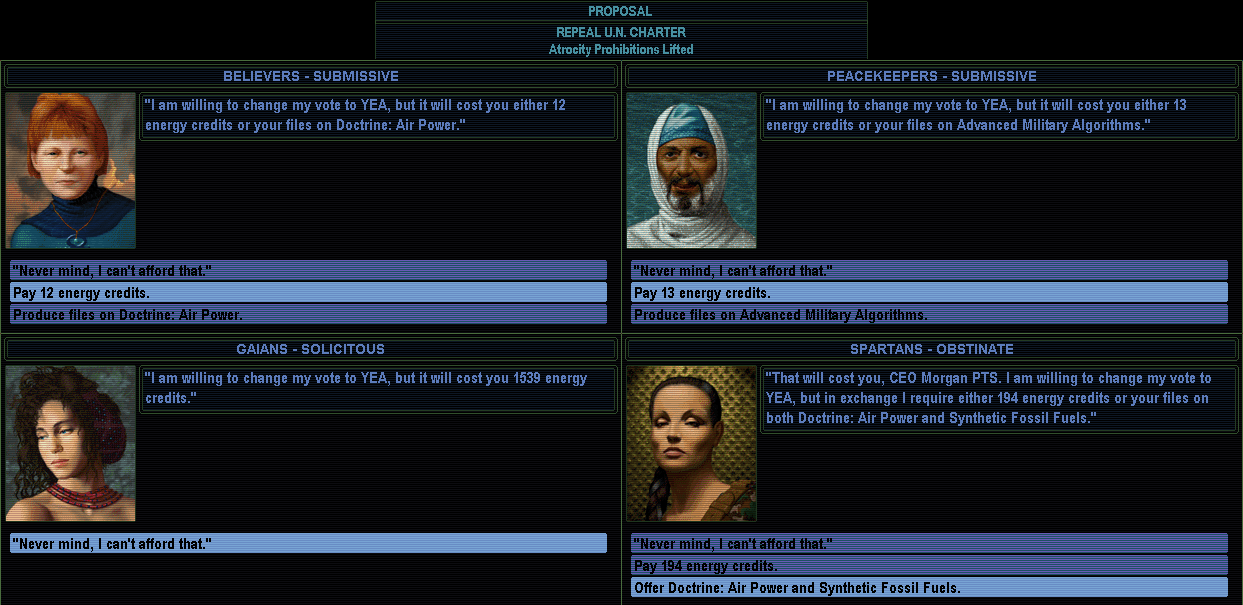
I had just reached Advanced Military Algorithms, the tech that allows a council proposal to repeal the UN charter against atrocity prohibitions. My submissive slaves acceeded to my bidding cheaply. Gaia asked for an impossibly exorbitant price (this was before she surrendered), as did both Yang and Zakharov. The wild card swing vote was Sparta, who demanded one heck of a cost in technology... but that was something I could pay, and did.
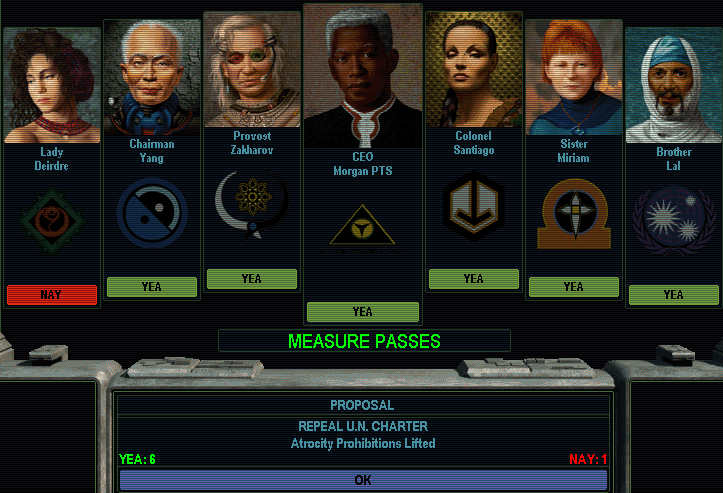
And so my proposal passed. Surprisingly, Yang and Zakharov voted for it anyway, even after trying to charge me a fortune for it. So I hadn't needed to pay up to Sparta, but hadn't known that.
Anyway, let's go over the effects of this. Repealing the UN charter now permits minor atrocities - nerve stapling and attacking with nerve gas - which no longer incur economic sanctions or eco-damage. (Yes, Planet behaves according to the status of the humans' UN charter.) There is now no consequence to these actions. It feels evil, but there is no comeuppance, no downside like the punishment sphere facility; in game terms it's a green light to do those as much as you want.

I greedily took advantage of this, of course, same as in my speed transcendence game. It would be a spectacular boon to pop-boom all the way with every base nerve-stapled to crack down all drone problems. I didn't staple right away; there is a time-limiting factor, bases develop a resistance to stapling so you can get only 20 or 30 turns out of it. I waited until just before the Cloning Vats would complete to start booming everything, then at that time nerve-stapled every single Morgan base.
Every Morgan base - because there is one exception to the atrocity repeal. As I learned in my speed-transcendence game, if you nerve staple a captured base, its original owner still considers that an atrocity against their citizens and will hate you forever, even to breaking out of a submissive pact. (I believe this occurs in the code so that the other minor atrocity - obliterating a base with a military unit - will still count also; although there's really never any reason to do that since you can peacefully disband a base by simply building a colony pod at size 1.) So I refrained from stapling the captured bases. I could have anyway, but decided I'd prefer to keep the submissive pactmates and the game would be a bit more interesting in having to figure out how to handle those bases differently. If I'd known I would pull off repealing the charter, I would have prepared for it by building colony pods out of the captured bases to disband and rebuild each as a Morgan base, but most of them were now halfway through building their hab complex so I didn't want to waste that.

A little while later, I did decide to staple the Gaian bases anyway. They were large and productive and numerous (six bases), which I decided was worth the cost of the one vendetta. This is the only way I've ever seen a surrendered faction break out of the submissive pact. It actually didn't happen right away, Gaia didn't say anything until the next time she contacted me for something else, which didn't happen until ten turns later when I was well on the way to transcendence.
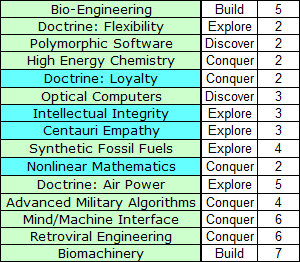
Anyway, the real thrust now was to the Cloning Vats. The path to Biomachinery proceeded as shown here, with the techs off the direct beeline highlighted, including the diversion into Green economics as described. Nonlinear Mathematics happened to be available to steal at a time when it wouldn't disturb anything regarding missing-techs, so I took the opportunity. The line did go through air power, so I did build a few needlejets to help take care of my border conflicts. Retroviral Engineering enables genejack factories, but this time I didn't build those, I'd hardly built boreholes so the bases never had enough minerals to be worth multiplying.
The Cloning Vats would of course be my big turning point of domestic development. This is the same thing the Hive game had also done, of course. But that's what both of those factions really want to do, the factions that most need that project, to make up for their inherent difficulties with population booming. Thanks to skipping the ecological line of techs, Morgan would get to the Vats significantly sooner than had the Hive, by a margin of four techs and sixteen turns.
I reached Biomachinery at the start of year 2181 (late in the production cycle so I didn't bother trying to rush the Vats in mid-upkeep that same turn), then built the Cloning Vats with upgraded crawlers in my HQ at the start of 2182. Since the Vats would complete in the first base, all other bases would get the benefit and start booming that same turn. I prepared for this by nerve-stapling everything on the turn before, and in the longer term had also prepared by building lots of condensors everywhere for food.
About half of the bases had built their hab complexes by that point. To buy most of the remaining ones, I shut off research to 100% economy instead for two turns. (Remember Morgan bases are limited to size 4, so the complexes were mandatory for the booming to get anywhere useful.)
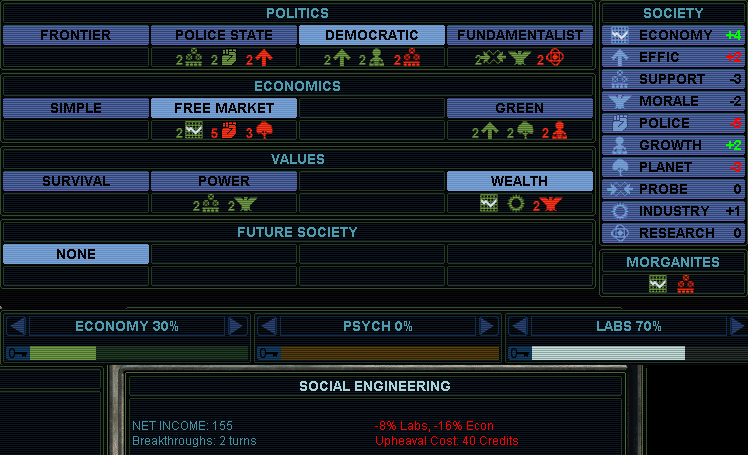
Then I realized another power play: I could even go back to Free Market! The big reason to get out of FM had been police units, which had saved more in psych spending than FM's economy had been yielding. But now with every drone nerve-stapled, I could stay at 0% psych while also reaping Free Market's extra 4 energy per base, now not huge but still positive value over any Green configuration. I did drop the labs slider from 100%, since that would be a significant unbalancing penalty without the maximum efficiency of Green. I found a sweet spot in Free Market at 70% labs / 30% economy, which would make about the same 650 labs output as the Green/100% configuration, but also 150 cash income to keep buying the last few hab complexes.
I managed the population boom same as in the Hive game and always: every turn, scroll through every base and make sure it has exactly +2 food to grow. My formers were working hard on condensors, but presently I realized they needed to work more efficiently on food, and the way to do that was to convert rainy forest tiles to farms instead. That adds +2 food for 3 turns of former labor (with Weather Paradigm), a much better deal than +1 for 8 turns of building a condensor. All the extra population became specialists contributing more research.
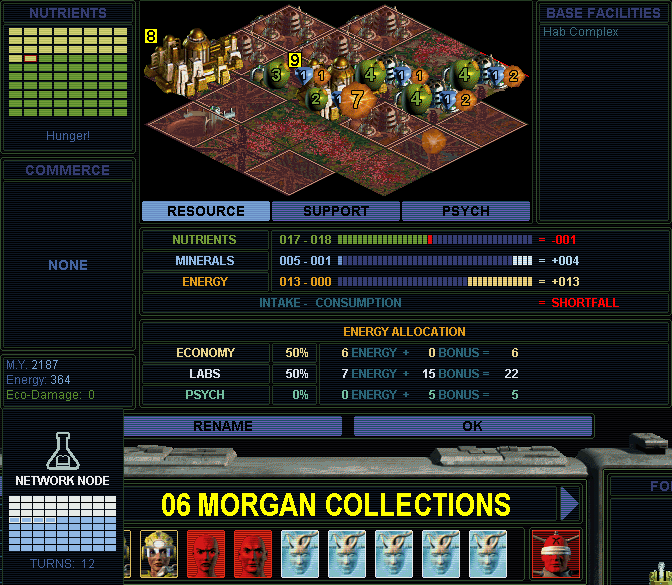
This got most bases to around size 9, at which time I'd exhausted all the food I could produce and the population boom stalled out in most bases. What I needed now was food satellites to keep that going. Fortunately that was a short distance away, just three techs and none turned up missing: Cyberethics, Pre-Sentient Algorithms, Orbital Spaceflight.
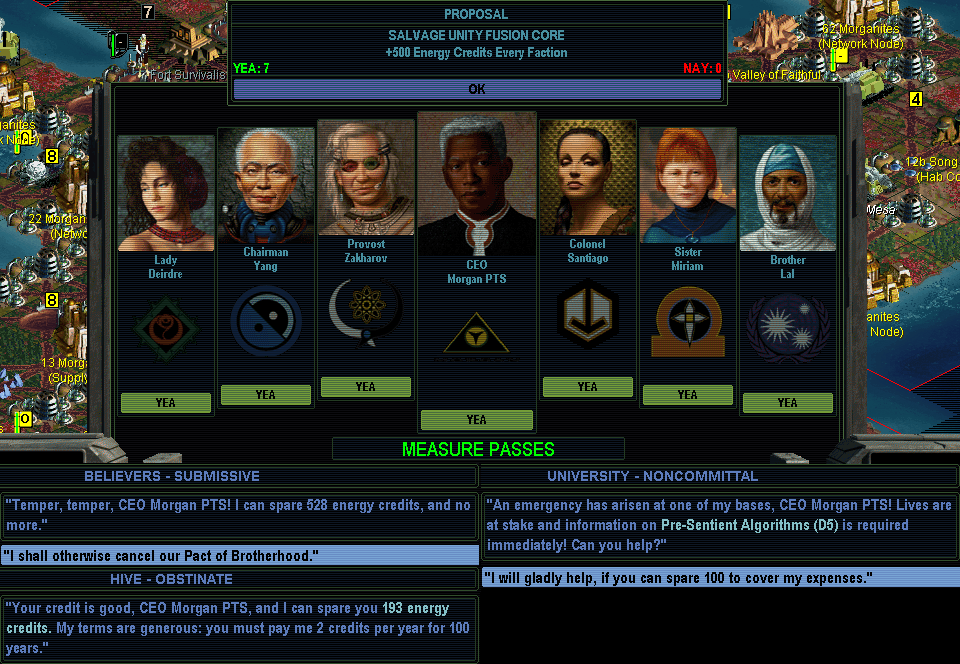
Orbital Spaceflight enables another interesting council proposal: Salvage the Unity Fusion Core from orbit to give every faction 500 energy. That meant not only my own profit, but I could also extract much of the other factions' shares for myself too with sales and loans. From my submissive pactmates I demanded the cash with the "otherwise cancel Pact" option. I am not sure how far the game lets you go with this, how much the vassals are compelled to do what you say, if they are ever allowed to refuse or even break the pact, but at any rate here I was able to take all their cash to a total of around 1800.

That cash went into a massive satellite-buying program, which I precisely planned for. On turn 2187, one turn before finishing Orbital Spaceflight, I rushed four aerospace complexes, making sure to overflow to 10 minerals in each box (so the next rush doesn't incur the penalty for being under 10 minerals.) Then in 2188, I rushed four satellites, and continued doing that on each of the next several turns. This made the population boom easy to manage. The rushed satellites were early in the production order, so every base downstream would get an additional 2 food every turn (four satellites which are halved without an aerospace complex.) The pop-boom would consume that 2 food, then four more satellites would do it again next turn. Although every turn I would have to scroll through all the bases and reassign the newly-grown citizens from crappy fungus or ocean tiles to be specialists instead.
The next breakpoint, the very next turn, was Fusion Power. That enables Engineer specialists, for +3 economy and +2 labs, a big leap in productivity. I converted every specialist to those, over 200 in all. And then I switched back to Green economics again, since now I needed the efficiency to run 100% labs slider again, since the engineer specialists would provide well more than enough income.
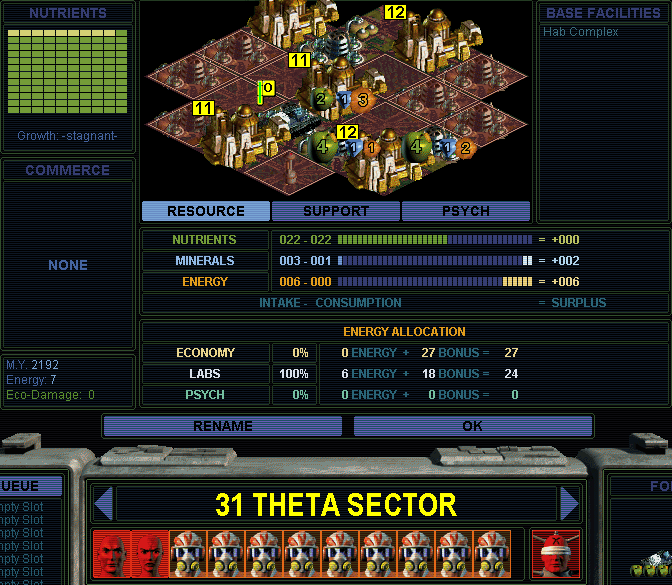
Now each base looked like this. Almost every population is an engineer specialist, supported by satellite food and just a few condensors. 27 energy and 24 labs may not look like much -- but multiply that by 70 ICS bases. Now my net energy production came to 500 and labs to 1500. Bases with more forests had started to complete their network nodes, and then some got fusion labs (the next science multiplier) as well.
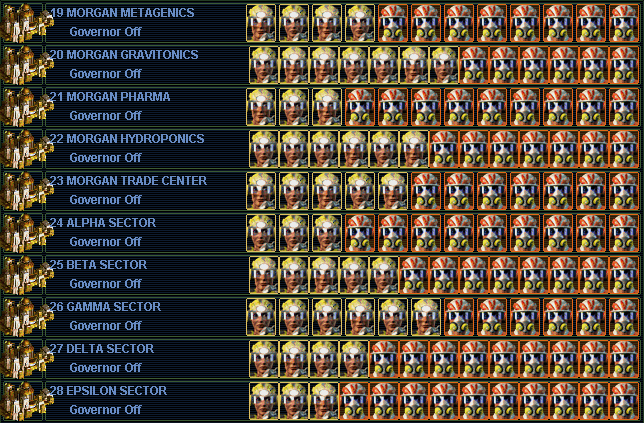
I was really satisfied with this, the most and best use I ever made of the engineers. It seems like every game sees me switching the engineers back to thinkers for some reason, either for the psych or because I need the labs more or because there isn't anything efficient enough to convert the money into, but here the engineers fully paid off.
The next tech was Planetary Economics for the Ascetic Virtues to raise the population cap by another two (to 13 total). Next came Advanced Spaceflight, for energy satellites which would be the next spending outlet. I finished all my food satellites, up to a total of 25 which gives the maximum yield to size-13 bases (halved rounded up), then started rushing as many as six energy satellites per turn (with the same mechanism, make sure each base overflows by 10 minerals to rush again next turn.) The satellite energy multiplied by 70 bases raised my overall labs productivity by half yet again.

In Council news, Zakharov tried to reinstate the UN charter. Everybody wanted to, so I had to buy one vote from my submissive for my veto to carry. Then I applied the second round of nerve stapling after the first ran out after ten turns.

Also in Council news, at my next opportunity (ten turns) after the fusion core, I proposed and passed the Global Trade Pact.
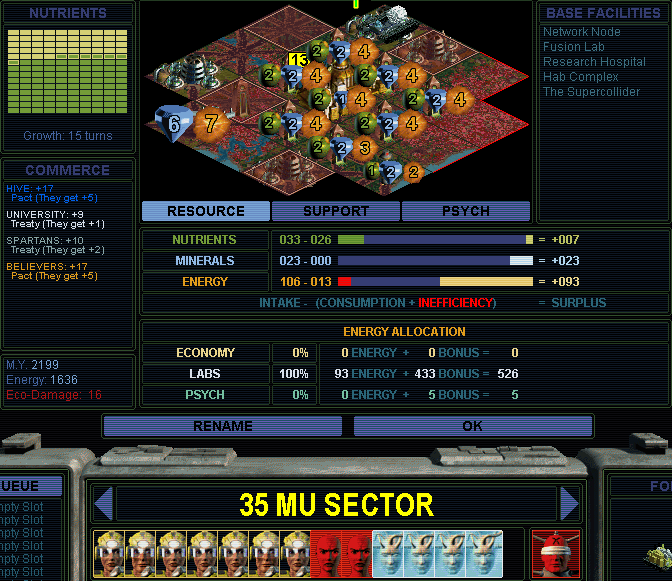
Check out those enormous commerce numbers. It turned out that my base at the monuments of the Ruins was producing the most energy and therefore the most commerce as well. So I made this my super-science-center with the labs-doubling Supercollider and then Theory of Everything, along with a rushed research hospital. I had never concentrated any effort into an SSC earlier (no base had stood out to be one), and this was still slightly half-assed, but it was at least somewhere within the ballpark of optimal. At least if I wasn't managing an SSC, I didn't have to micromanage my way around its overflow limitations.
It's worth noting what else didn't happen in this game. I never built many boreholes (too busy on condensors instead) until the last few turns, after the pop-boom had fully finished. In turn, eco-damage also mostly wasn't happening. A few bases that were working one borehole and a few forests did trigger a few fungal pops here and there, but mostly my bases never passed the 16-mineral danger threshold, and I went the whole game never seeing any threat from sea levels.
The other element that's missing was supply crawlers. There were no free tiles for them to work, and they were not productive enough. A supply crawler would crawl a condensor, for that citizen to instead become a specialist. But that was too small a net gain; crawling a condensor would miss out on the tile's energy and mineral yield, so the engineer would only gain a net of about 3 economic productivity. 30 minerals for +3 isn't good enough compared to a network node that would be 80 minerals for 10 or more labs.
Turn the page for the conclusion.